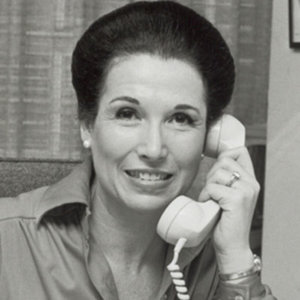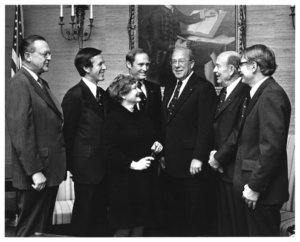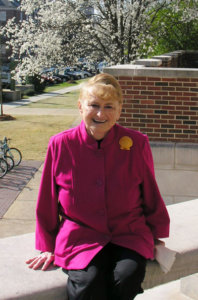A Toast to the Greats – The Past
Published on March 27, 2018, at 8:44 p.m.
by Erica Cooke.
We know about the women who came before us, the adversity they faced and the miles they marched. We remember the steps they took, the conversations about 77 cents on the dollar and the most recent campaign, #TimesUp.
March is Women’s History Month, a time to reflect on the past, think about the present and dream about the future. Everywhere we look there is something reminding us to stand up for equality and justice. To the right, we see even in a female-dominated industry, such as public relations, only 17 percent of C-suite executives are women. To the left, we see celebrities wearing all black at awards shows to support women who have been victims of sexual harassment. While, to some, this might not seem to be enough, it’s imperative to remember where women were just a few decades ago.
Two women who paved the road to equality were Muriel Fox and Betsy Plank.

Fox, a co-founder of the National Organization for Women, is a 90-year-old feminism activist. Fox graduated from Barnard College in 1948 and has been paving the path for female equality ever since.
When interviewing for a position at Carl Byoir & Associates, Fox was denied on the following basis: “We don’t hire women writers.” This sparked the fire that would help change the world.
“I went away and I accepted it,” Fox said. “I knew I wanted to be a writer, maybe even a labor columnist one day. I worked very hard, and I was respected.”
Fox’s approach to combat sexism was to go at it straight on. She spearheaded the communications efforts for NOW, raised millions of dollars for various causes, organized marches and worked to pass the Equal Credit Opportunity Act in the 1970s.
Many women’s lives have been drastically altered because of Fox’s passion and advocacy. She publicly fought for equal opportunities. She wanted to prove that she — and every other woman — was just as good as a man.
“I probably worked much harder,” Fox said. “Many of the men probably went home on the 5 o’clock train, and I was still at the office getting my work done. I worked harder than them, and they respected me. Maybe in some ways they thought I was the exception.”
If so, Fox wasn’t the only exception to the rule. Plank, known as the first lady of public relations, stood her ground against ongoing sexism. Plank dismantled the unfair standards in her own way.

Plank was noted as a part of the “good old boys club.” This meant it was never about gender; it was about professionalizing the field and representing everyone. She never talked about “sad stories” of discrimination or inequality. No. Plank saw the injustices as obstacles or challenges she would face — and conquer.
Plank commented on an article from the Chicago Sun-Times about discrimination. She described the realm of business to be a “man’s world,” but she chose to be in it. Plank thought it was up to her to earn the respect of those with whom she worked — man or woman.
“Of course some discrimination exists even in public relations, which has been more receptive to women than most,” Plank said. “But complaining about the subject seems to be to be a needless waste of energy and time; today’s executive — whatever the gender — doesn’t have much of either to spare.”

Fox and Plank differ in this perspective. Both women fought for equal opportunity, but they had different angles of attack. Fox marched and inserted herself in the world of equality and publicly changed laws and regulations that helped women. Plank voluntarily jumped into the “man’s world.” She fought internally for women and showed it’s possible to thrive in such an environment.
The world is grateful for the contributions of both women. They propelled the profession forward and earned their place in history. Fox and Plank devoted their lives to giving a voice to others, specifically fellow women. Plank said it best: “We just got there differently.”
The future is now, and the future is female. While reflecting on the past, meditating on the present and dreaming of the future this month, remember to follow Fox’s mantra.
“Feminism is fairness and judging people as individuals,” she said. “We’re counting on younger women to pass on the torch because the battle still has to be fought. We’re counting on the younger [generation] to continue the battle. When someone asks, ‘Are you a feminist?,’ you say, ‘Yes, I am because I believe in equal treatment for all individuals.'”




